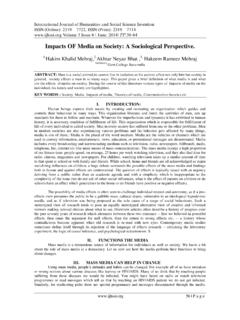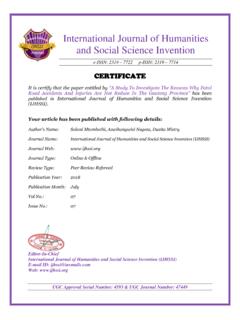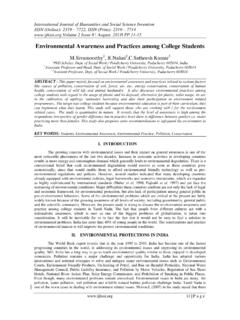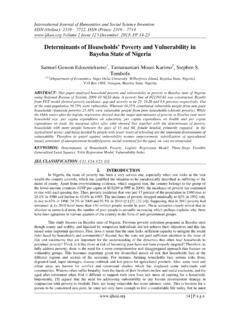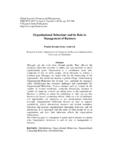Transcription of Total Quality Management in Education: An Analysis
1 International Journal of Humanities and Social Science Invention ISSN (Online): 2319 7722, ISSN (Print): 2319 7714. Volume 3 Issue 6 June. 2014 Total Quality Management in Education: An Analysis 1, Iftikhaar Ahmad Wani , 2, Hakim Khalid Mehraj KEY TERMS: Total Quality Management (TQM,Continuous Quality Improvement (CQI), Strategic Quality Management (SQM), Quality , I. INTRODUCTION. Quality means degree of excellence. It means peculiar and essential character that makes something unique and the best of its kind. It means a characteristic or a feature that something has and can be noticed as a part of it. It means how good and useful something is. It is a utilitarian and contributive feature of the product.)
2 Quality is the inspiration for transcendence. It is generally defined as conformance to requirements. It is also conformance to standard that is required. Many consider that Quality need not be conformance to requirements but should be an assurance of being the best in the world of that type. In addition it should also keep constancy of purpose. There are a number of researchers with this concept who formulated frameworks for Continuous Quality Improvement (CQI), Strategic Quality Management (SQM) or now the latest Total Quality Management (TQM). Even though there might be some differences among these approaches, TQM is considered to be more general to capture essence of Quality improvements.
3 Total Quality refers not only to product but also to the way the product is presented to the customer. It is continuous improvement plan, with an effort to bring out the best. It is a concept which has been viewed as a customer focused process, which needs for continuous improvement and meeting customers perceptions. For good understanding of the concept, Witcher (1990) defines the term by breaking the phrase into three parts whereby Total implies every person is involved (including customers and suppliers), Quality implies customer requirements are met exactly and Management , implies senior executives are committed. TQM has been viewed as a customer focused process, which seeks for continuous improvement.
4 It is a concept rather than a simple program or method which has many dimensions like planning, effective communication etc. by which every aspect can be improved and made effective . TQM is a Management philosophy that builds a customer-driven learning organization, dedicated to Total customer satisfaction through continuous improvement in the effectiveness and efficiency of the organization and its processes. Total Quality Management provides what is required, as judged by the client. It is accomplished through everyone in the organization being committed to achieve results, a passion for Quality and decisions based on performance data. TQM emphasize that it is important for all elements to fit together to turn raw materials into the products and deliverables that satisfy clients.
5 Customer satisfaction is the result most addressed by TQM (describe the basic tenets of TQM which are as follows: long-term perspective, customer focus, and top Management commitment, system s thinking, training and tools in Quality , increased employee participation, development of a measurement and reporting system, improved communication between Management and labor, and continuous improvement . It can be seen that TQM describes two main notions: 1. Continuous improvement and 2. The tools and techniques/methods used. In general, TQM encompasses many Management and business philosophies and its focus gets shifted, based on the scenario where TQM is applied. Whether it is in industry or higher education, TQM philosophy revolves around the customer.)
6 It is an integrated organizational approach in delighting both external and internal customers by meeting their expectations on continuous bases through getting everyone involved with the organizational working on continuous improvement of all products, services and procedures along with proper problem solving methodology. It is an approach to improve the effectiveness and flexibility of the organization as a whole, through Total employee involvement in holistic term in all aspects, process and activities. TQM helps us to recognize the facts , we ourselves, who are responsible for Quality work not someone else, who will check it after it is done. TQM is not traditional approach, it is innovative one.
7 TQM is a Management philosophy that seeks to prevent poor Quality in products and services, rather than simply to detect and sort out defects. A basic concept of TQM is that Quality is measurable commodity and in order to improve we need to know where we are? Have we some idea? Or where we are going to? TQM not only represents a specific method or set of methods, but it represents a theory for transformation of organization. The definition of the term Quality is subject to change over the years. This change has been from meeting learners specification to satisfying the learners to meeting and exceeding future expectations. 71 | P a g e Total Quality Management In Education.
8 Total Quality Management used together is usually meant to recognize that real Quality requires all elements of the institution to work together towards achieving the concept of TQM is applicable to academics. Many educators believe that it provides guiding principles for needed educational reform. Students take classes, consume meals, sleep in residence halls, buy books and use many services for which they pay tuition other fees. The student certainly fits the definition of the word customer. Quality is an achievable measurable, profitable unit that can be achieved when one has the commitment and understanding and is prepared for the hard work. According to Stella and Grynam, (2004) Quality enhancement cannot be achieved as an administrative process.
9 It is a participative process involving various units of the institution, at all levels is likely to bring new strains together with unprecedented possibilities. Life in the coming decades in educational institutions at all levels is likely to bring new strains together with unprecedented possibilities. To enable the people to benefit in the new environment will require new designs of human resource development. Many of the strategies of Quality improvement in education are derived from industrial setting. Challenges to the adoption and implementation of Management concepts in educational institutions are several. One has to overcome the challenges to be able to take the best from industrial experiences and combine this in a holistic framework, with the methods more suited to the educational milieu.
10 Issues of TQM should be addressed in educational institutions, particularly as they relate to productivity and financing. Those adopting TQM in education have varying perspectives on the approach. Some see TQM as a Management system with customer or student satisfaction as the crucial element. Others see TQM. as a philosophy fostering change in an organization or the educational institutions. Academic institutions have used both the approaches in applying TQM in higher education settings. Quality of education takes into account external environment in which institutions operate: internal environment where teaching learning takes place and home environment of learners.


